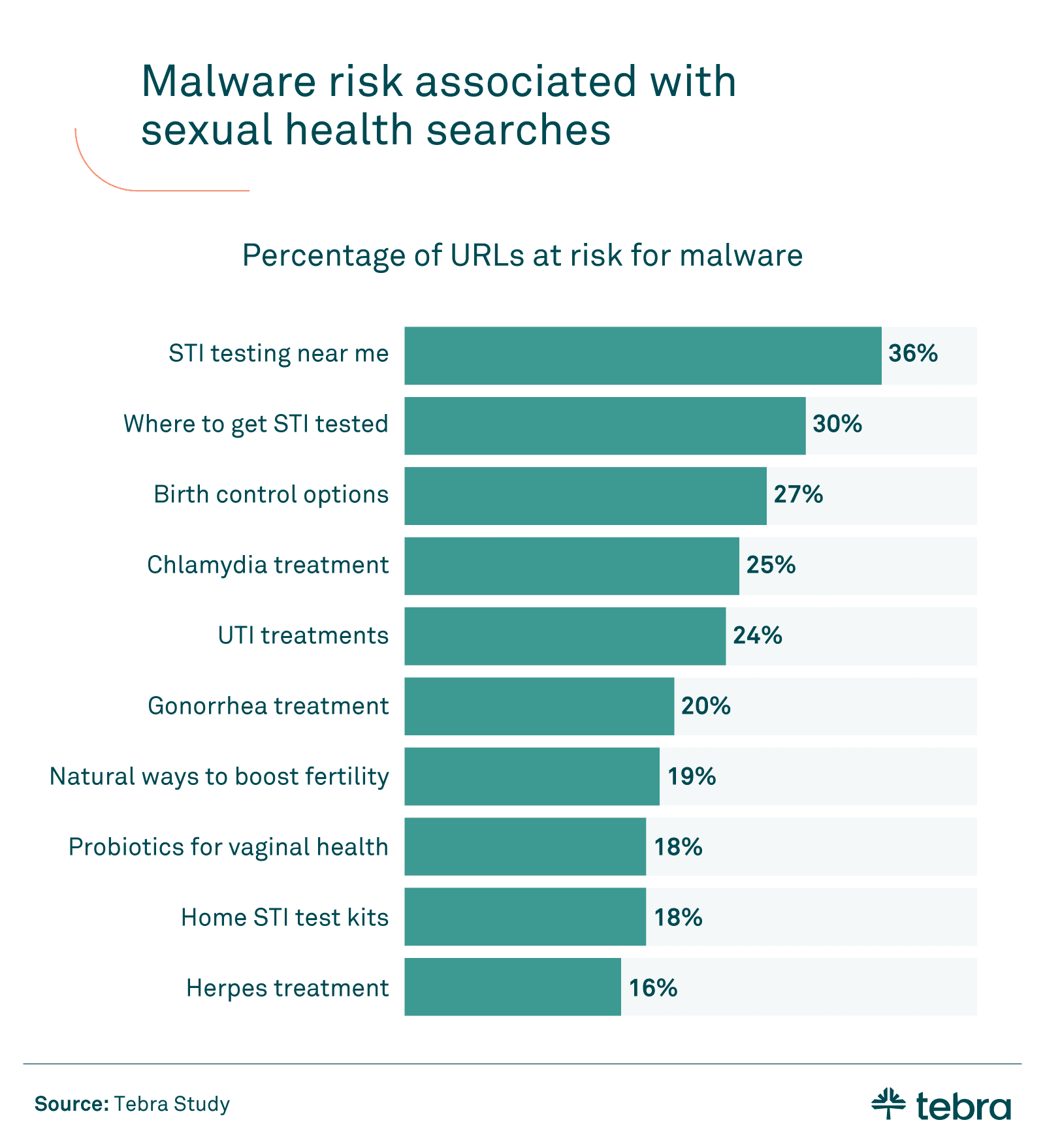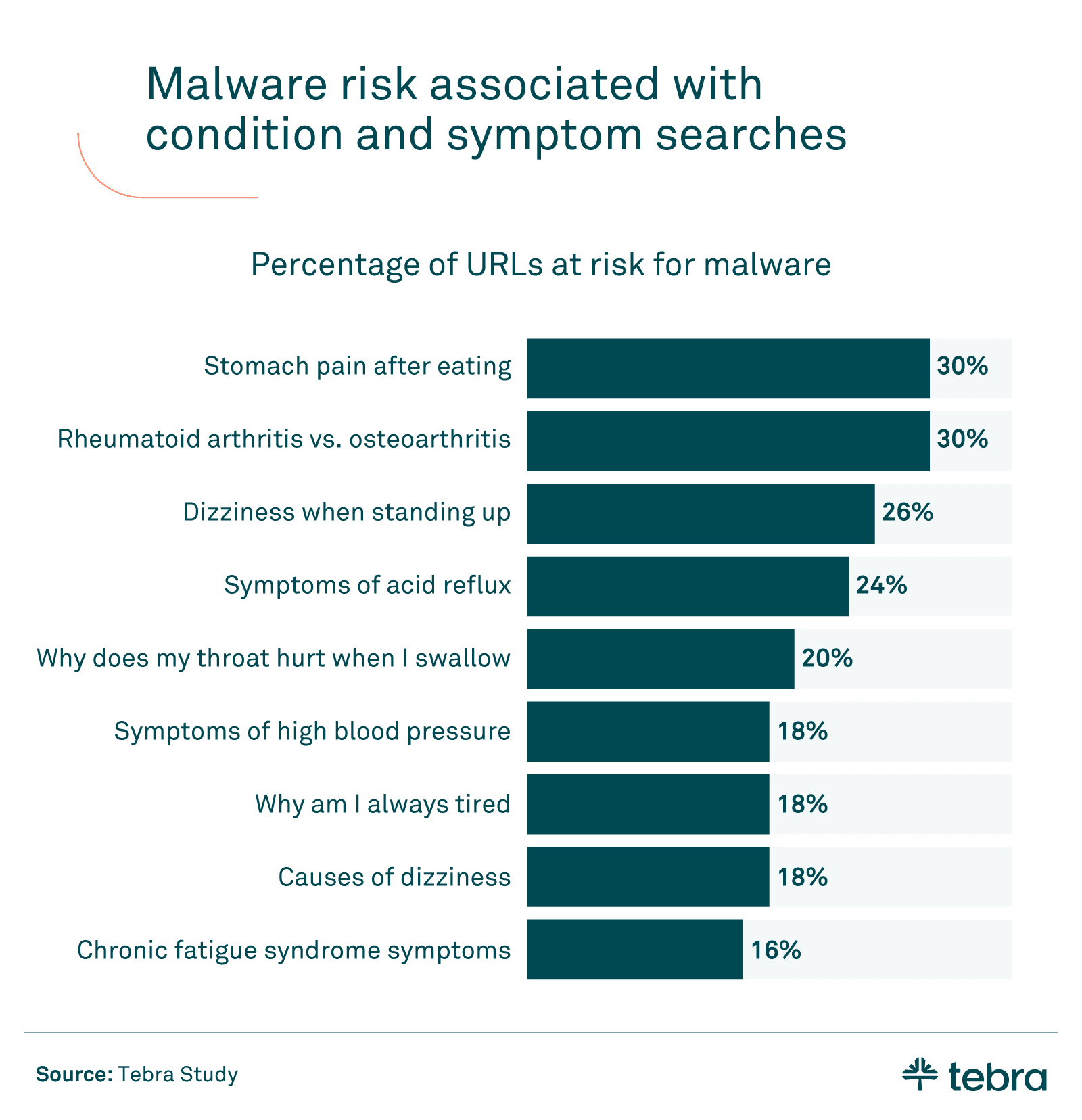Overview
- Search terms “STI testing near me” (36%), “flu shot near me” (34%), and “therapist near me” (34%) have the most potential malware links, making them the most dangerous health-related searches.
- Nearly 1 in 4 mental health-related URLs are at risk for malware.
- 30% of URLs related to “COVID vaccine near me” contain potential malware.
- 26% of URLs associated with “how to get Ozempic” are at risk for malware.
Your health-related Google search could be more dangerous than you think. While seeking medical information online is commonplace, it may expose you to unexpected cyber threats.
Tebra's recent study uncovered alarming rates of potential malware in health-related search results, ranging from mental health resources to treatment options for common ailments.
This article reveals the most dangerous health-related search terms and their associated cybersecurity risks. We'll explore the prevalence of malware across various health categories — including mental health, sexual health, and general wellness, and provide insights to help you navigate online health information more safely.
Malware risks in health-related searches
Health-related online searches can expose users to more than just medical information.
Malware, short for malicious software, is any program or file designed to harm or exploit computer systems, networks, or devices. It can take various forms, including viruses, Trojans, ransomware, and spyware, often disguising itself as legitimate software or hiding within seemingly harmless files.
Once installed, malware can steal sensitive information, damage or encrypt data, disrupt system operations, or even give attackers remote control over infected devices.
Here's how we conducted this study to identify the riskiest search terms.

This section explores the prevalence of potential malware risks across various health-related search categories. Websites identified as a medium risk or higher could contain malware or viruses. These URLs could also have been blacklisted by website security authorities (like Google), have configuration issues, or be running out-of-date software or vulnerable plugins.

The riskiest search term overall was "STI testing near me," with 36% of associated links posing a risk for malware. This was closely followed by "flu shot near me" and "therapist near me," both at 34%, rounding out the top 3 most dangerous health-related searches.
Mental health-related URLs also showed a significant risk, with nearly 1 in 4 containing potential malware. Sexual health searches weren't far behind, as more than 1 in 5 (23%) of these URLs were flagged for possible malware content. Across all health-related search terms examined, 22% had a potential risk of malware, highlighting the widespread nature of this issue in online health information seeking.
Mental health searches and cybersecurity risks
Mental health resources are increasingly sought online, but we uncovered potential risks lurking in these searches.

"Therapist near me" was one of the riskiest health-related searches: more than 1 in 3 associated URLs were flagged for potential malware. Depression treatment-related links also posed considerable threats, with 24% containing potential malware. ADHD treatment searches weren't far behind at 22%. These findings reflect the need for caution when seeking mental health resources online, as cyber threats may compound the challenges faced by those searching for help.
Cyber risks in sexual health searches
Sexual health information can be sought discreetly online, but these searches could also pose digital hazards.

STI testing-related searches posed the highest risk in this category: 36% of "STI testing near me" URLs and 30% of "where to get STI tested" URLs contained potential malware. "Birth control options" searches also showed significant vulnerability, with more than 1 in 4 (27%) associated URLs at risk for malware.
Searches for "chlamydia treatments" rounded out the top four, with 25% of related URLs flagged for potential cyber threats. It's important to rely on trusted sources and maintain digital vigilance when seeking sensitive sexual health information online.
Risky health and wellness searches
Common health and wellness searches may expose users to unexpected digital threats.

"Flu shot near me" topped the risk list in this category, with 34% of associated URLs harboring potential malware. COVID-19 vaccine searches weren't far behind: 30% of "COVID vaccine near me" URLs were flagged as risky. Even weight loss information posed significant threats, as 26% of "best diets for weight loss" and "diet plans for weight loss" URLs contained potential malware. Even seemingly innocuous routine health information searches can lead to compromised digital safety.
Malware risks of symptom searches
Searching for information about health conditions and symptoms online is common, but our study reveals potential cybersecurity hazards in these queries.

Searches related to digestive issues and joint pain showed the highest risk: 3 in 10 URLs associated with "stomach pain after eating" and "rheumatoid arthritis vs. osteoarthritis" contained potential malware.
Some dizziness-related searches also posed a threat, with more than 1 in 4 (26%) URLs linked to "dizziness when standing up" flagged for malware risk. Acid reflux symptom searches rounded out the top 4, as 24% of related URLs were identified as potentially harmful. These findings point to the need for caution when researching health symptoms online, as cyber risks may compound health concerns.
Digital danger in remedy searches
Searching for information about medical treatments and remedies can expose users to unexpected online risks as well.

Ozempic, a popular weight loss medication, topped the risk list in this category: 26% of URLs associated with "how to get Ozempic" were flagged for potential malware. Lower back pain relief searches and treatments for acid reflux also showed some vulnerability, with 22% of related URLs at risk for malware.
Cholesterol medication queries had a lower but still notable threat, as 1 in 10 associated URLs contained potential malware. These findings emphasize how even searches for legitimate medications can lead to compromised digital safety.
Staying safe while staying informed
From mental health resources to treatment options, the digital world of health information can have hidden dangers. However, by taking a few precautionary steps, you can protect yourself while staying informed: stick to reputable websites and official health organizations, equip your devices with reliable antivirus and anti-malware programs, and avoid clicking on unfamiliar or suspicious links. Keeping your software and security tools updated is also recommended. By approaching online health searches with caution and using these protective measures, you can safeguard your digital well-being while accessing the health information you need.
Methodology
To identify the most dangerous health-related search terms, we compiled a list of the most commonly searched health-related terms (based on search volume via Google Trends). We then searched each term on Google, collecting the first 50 result links and analyzing them with a malware detector tool to assess risk levels. Risk levels were determined based on several factors, including the presence of malware, viruses, blacklisting status, website errors, out-of-date software, and malicious code detected in the website's publicly accessible content.
Our data presents the percentage of links with a medium or higher risk level for each search term. Note that the first 50 result links may vary by searcher location.
About Tebra
In 2021, with a combined mission to unlock better healthcare, Kareo and PatientPop joined forces to form Tebra — a complete practice automation solution for independent healthcare providers. With an all-in-one, purpose-built platform to drive practice success and modernize every step of the patient journey, Tebra provides digital tools and support to attract new patients, deliver modern care, get paid quickly, and operate efficiently. To learn more about how Tebra is committed to improving patients' and providers' success and well-being, visit www.tebra.com.
Fair use statement
You may share this data noncommercially if you include a reference link.
Download your free resource now
Access it instantly — just complete the form








